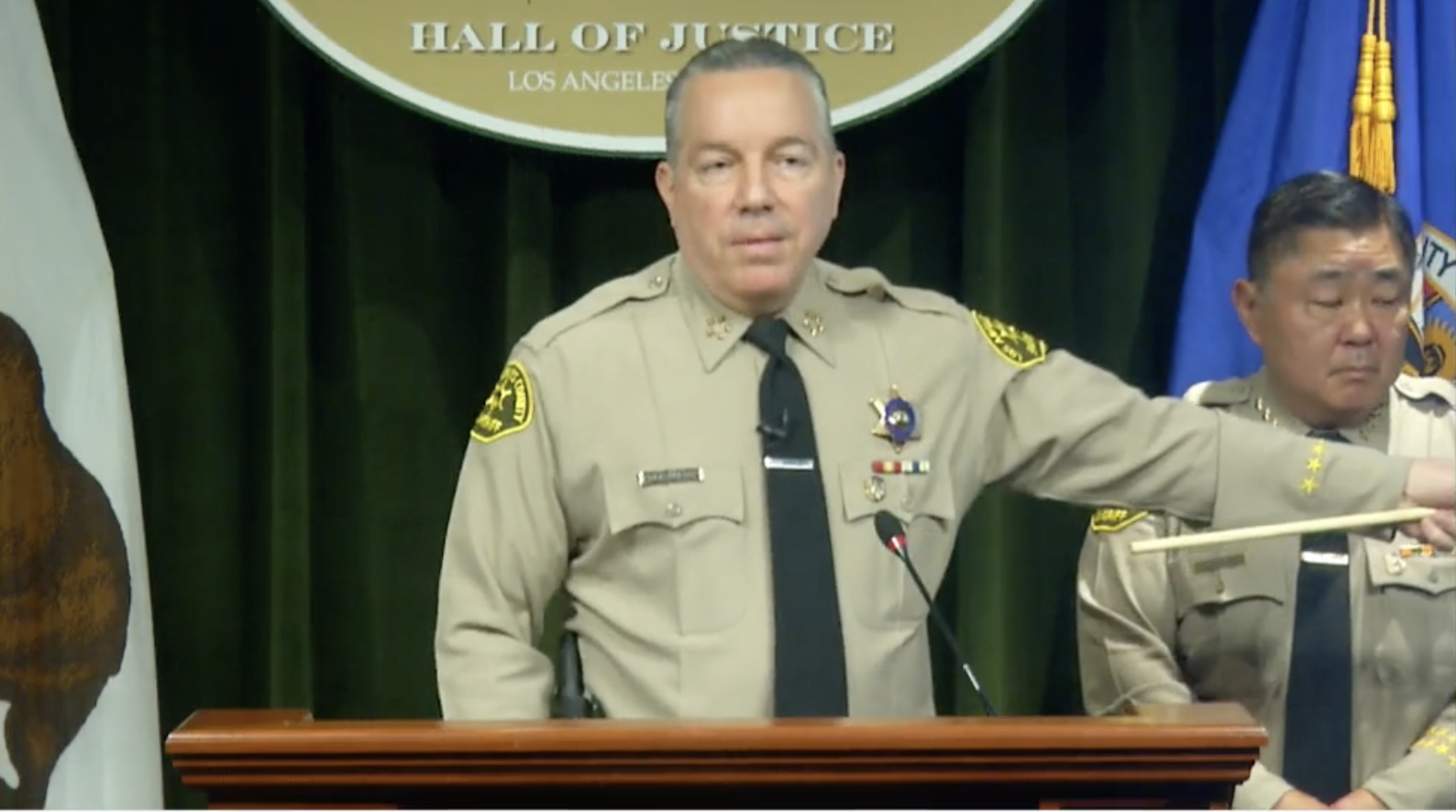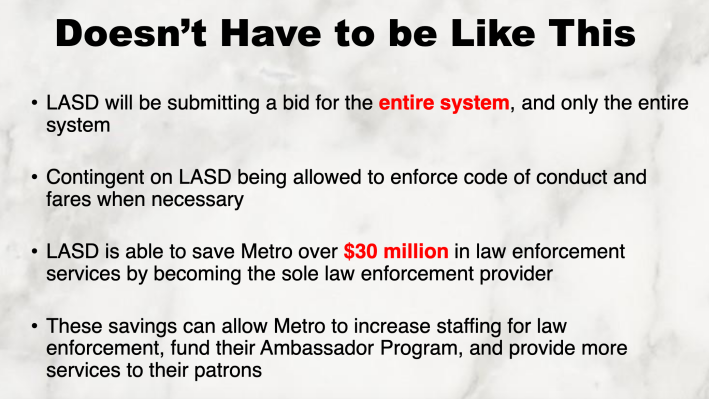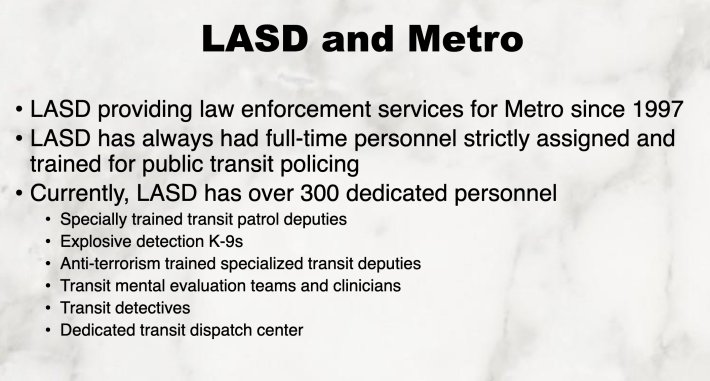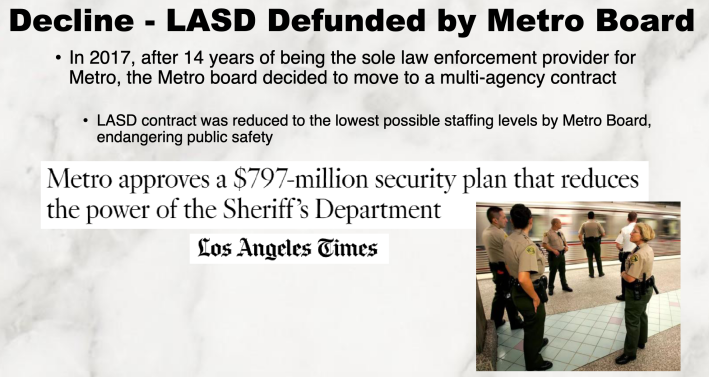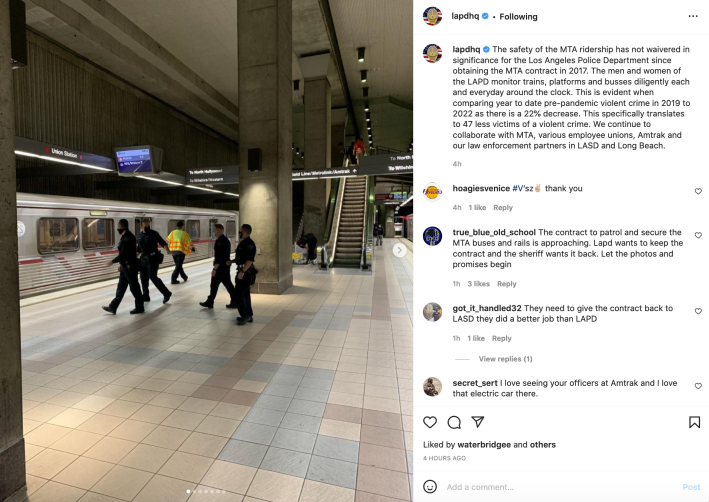Never one to miss out on an opportunity to fearmonger, L.A. County Sheriff Alex Villanueva launched yesterday's Metro-specific press conference with the claim that by "consistently aiming at degrading and defunding law enforcement" and "degrading the capacity of law enforcement to address crime in a proactive manner," the Metro Board of Directors had opened the door for the kind of horrific assault on transit passengers New York City had just experienced.
Then, after ticking off a list high-profile incidences of violence and a series of events involving unhoused people, he issued an "ultimatum" to the Metro Board, declaring that if his demands were not met - namely, for the sheriff's department to become the sole agency responsible for policing the entire Metro transit system in the way the department saw fit as of July 1 - he would effectively take his toys and go home. His deputies would be reassigned to other areas.
The ultimatum was outlined in a letter submitted to Metro. And also on a marbled powerpoint slide (below).
The sheriff's saber-rattling was neither new nor unexpected.
Villanueva has openly clashed with much of the Metro board about what he views as their "woke" agenda for some time now. Last November, at a similarly grievance-laced press conference, he grumbled about the board's creation of the Public Safety Advisory Committee (PSAC) - a civilian group convened to help Metro develop a community-based approach to public safety on the transit system - calling it an "anti-law enforcement advisory group" and decrying its members' “woke” affiliations.
Part of his strategy has been to depict Metro's shift toward community-oriented policing, unarmed transit ambassadors and security guards, and outreach workers as an effort to completely eliminate law enforcement from the system - something he described as "a suicide pact that [LASD is] not going to participate in."
Untrue as such a claim about Metro's ultimate goal might be, it allows Villanueva to, at least rhetorically, position himself as the only one who truly cares about law and order or victims of crime. Such a stance, in turn, makes him the only one who can save the system. Thus, by last December, as Metro prepared to approve two extensions prolonging the current multi-agency policing contract with LAPD, LBPD, and LASD through June 2023, Villanueva had already made clear (via Facebook livestream) that his aim was to see the multi-agency approach scrapped and the full contract - and full enforcement power - returned to the sheriff's department.
The benefit, he explained at the time, was that, unlike either Long Beach PD or LAPD, the sheriff's department had transit-dedicated deputies and didn't operate on an overtime model. Not only would they save Metro around $30 million that way, he had said, his deputies were also better prepared to meet threats like terrorism or moving unhoused people off trains.
Villanueva reiterated many of those same claims again yesterday (above), while also showing images of unhoused people, attempting to link high-profile incidences of violence to the creation of Metro's Transit Court and the lack of fare enforcement, claiming the 2017 multi-agency contract had unleashed "mayhem," declaring that crime was "increasing every year like clockwork," and encouraging people to watch his "viral" video depicting the horrors he experienced on a recent trip to Hollywood on the Red Line (below).

At no time during the 40-minute press event did he mention the reasons Metro had wrested the full policing contract from LASD back in 2017.
Certainly there were enough to choose from. A 2014 audit had found glaring faults in LASD's performance, including the lack of a system-wide plan, a failure to coordinate well with other local law enforcement agencies (for stations and stops where jurisdiction overlapped), the under-reporting of crime, the lack of a visible presence on trains and buses, billing for staff or services not provided, slow response times to calls for help, the lack of skills among those assigned to the transit bureau, and the prevalent view among deputies that being assigned to the bureau carried less prestige or was a form of punishment.
Biased policing had been an issue as well. There were unheeded complaints about deputies that had racked up multiple uses of force, as well as concerns that LASD was not tracking uses of force or fully investigating complaints. And after having filed a complaint in 2016, the Labor/Community Strategy Center finally filed a lawsuit regarding Metro's failure to curb LASD's disproportionate citation of Black riders for fare evasion and minor code of conduct violations the following year.
There had also been considerable friction between Metro and the sheriff's department regarding the role of LASD at the time. Most notably, it centered around LASD's documented disinterest in policing the same "broken windows" and code of conduct issues Villanueva is now claiming he is being prevented from addressing. And although LASD had made clear at the time that they preferred to focus on crime suppression, the audit notes they weren't particularly good at that either: crime (including aggravated assaults and robberies) had risen between 2009 and 2013.
A more recent audit suggests that LASD is still not eager to meet all of Metro's mandates, like providing information on the specific training deputies receive in the area of Problem Oriented Policing or ensuring all of their deputies are Peace Officer Standards and Training (POST)-certified before being assigned to Metro.
But rather than acknowledge any of these issues, Villanueva instead preferred to position LASD as the victim. First of a woke media campaign, pointing to the L.A. Times' headline touting the new policing contract and snarking, "and of course, here's the Times celebrating [the new plan] 'that reduces the power of the sheriff's department.' Oh my god!" (below). Then of Transit Court, which he said had much more recent origins than it actually does and which he claimed had tied his department's hands, despite the fact the number of citations substantially increased in the year immediately after the contract was shifted from LASD to the multi-agency approach. Then of "defunding" efforts...while also claiming Metro is paying more for a policing contract than it needs to.
The statement L.A. County Supervisor and Metro Board Chair Hilda Solis provided to Fox News 11 aptly summarized the contradictions inherent in Villanueva's approach. Declaring the politicization of the Brooklyn subway shooting to be "beyond the pale," and his willingness to jeopardize law enforcement's ability to respond to issues on Metro alarming, she pointed out that his "soundbite of being defunded would not only be inaccurate, but he would essentially be defunding his own department if not awarded a sole contract."
And given that Metro's policing contract will soon be bid for a July 2023 contract restart, it is unclear how Villanueva will submit such a July 2022 bid, beyond his letter and powerpoint presentation. Or whether he will be in breach of contract, should Metro extend the contract again and the department refuses to comply. Or how his bluster will impact either his efforts to seek leverage in that process or his recently hatched plans to once again move into LAPD's jurisdiction and push the unhoused community away from Hollywood Boulevard.
For its part, LAPD took to social media following Villanueva's press conference, touting their own effectiveness at patrolling Metro and playing well with others. They also contested Villanueva's claim that crime had risen on the system, pointing to the 22 percent decrease in violent crime in relation to 2019.
A slightly chastened, but not humbled, Villanueva quickly issued a clarification declaring he had not intended to cast any "dispersions" upon either the LAPD or the Los Angeles Police Protective League and that his comments were directed at "the decisions made by the city of Los Angeles and the MTA board."
The rest, it appears, he is standing by.
